Dell Med’s most recent graduating class had a 100% match in the initial match period and matched to programs across 18 states. More than one third of graduates pursued specialties in primary care. But the significance goes beyond numbers.

Since graduating its inaugural class in 2020, Dell Med has seen its former students embark on influential careers in medicine. Matching to programs from Johns Hopkins to Mayo Clinic, these alumni have secured positions in esteemed residencies and fellowships nationwide, making strides in providing world-class patient care and tackling systemic issues in health.
Hear from former students as they reflect on their Dell Med experience and how it equipped them for success in specialties including:
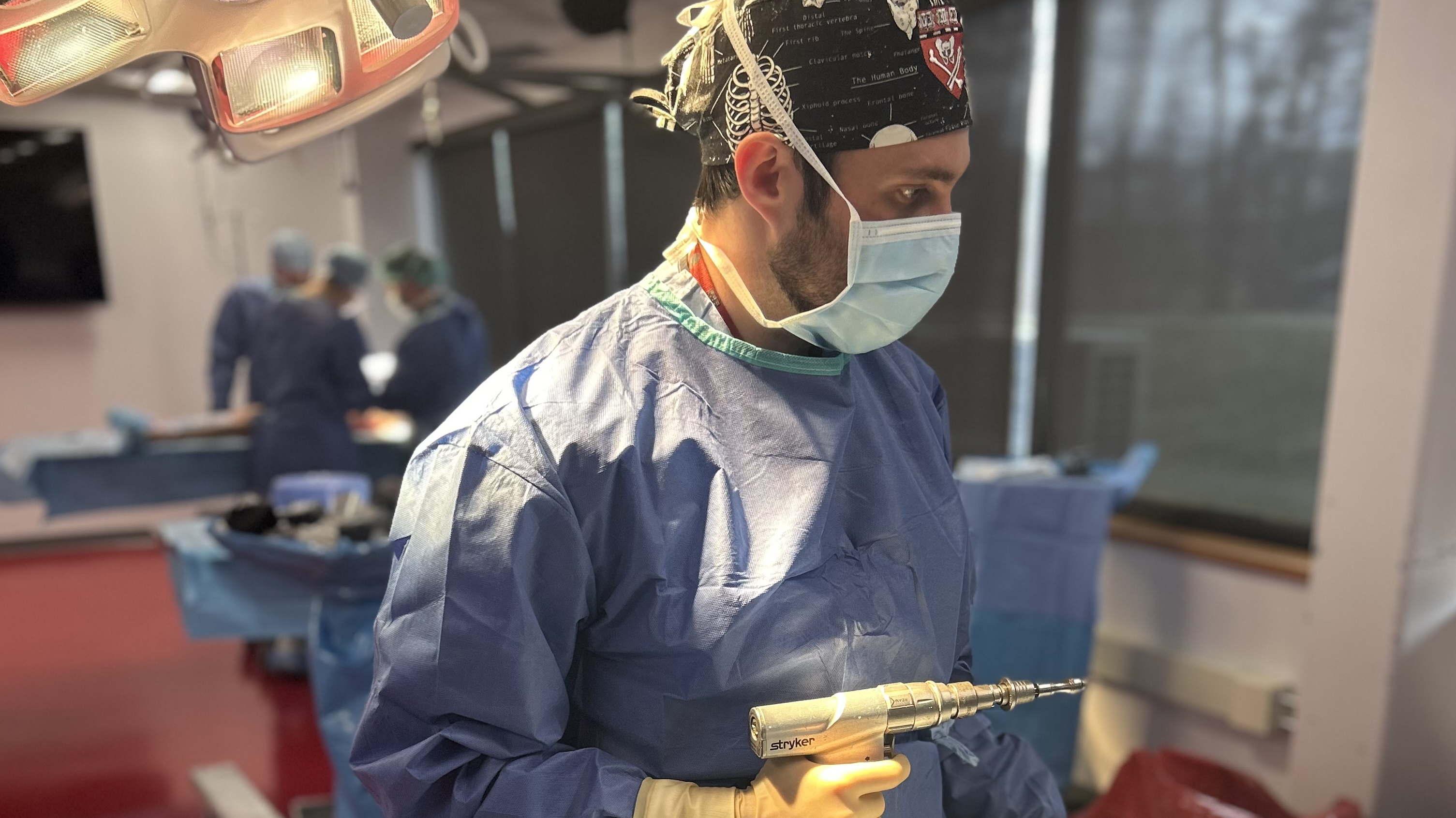
Jeremiah Alexander, M.D.
Jeremiah Alexander, M.D.
Dell Med Class of 2023
Residency: Year 2, Orthopaedic Surgery, Harvard Medical School
In what ways did Dell Med prepare you for residency?
In addition to teaching me the fundamentals of medicine, Dell Med really emphasized the need for value-based care, which essentially means that as physicians, part of our role is to maximize the outcome for the patient while minimizing the cost. Cost means more than the financial burden that a patient incurs — it refers to terrible complications as well.
As an orthopaedic surgery resident, I utilize this principle frequently — specifically, we sometimes treat frail, elderly patients with hip fractures without surgery, and this is because of the “cost” of surgery. They may not recover due to comorbidities or their functional status at baseline is poor, so we have to ask ourselves, “What benefit does surgery provide to this patient?”
Desert island: You can only bring three things (memories, lessons, people, etc.) from your Dell Med experience with you. What would you choose?
I would choose the people, memories and of course the food. I met classmates who will be lifelong friends. From the beginning of medical school in our small groups to studying for boards together, I worked with and became friends with wonderful people. The memories I made in Austin during medical school are unforgettable. Spending time with caring surgeons in their backyards to camping with classmates — I had a great time. Of course, I can’t leave out the food in Austin, which is among the best in the country!
If you could go back and tell the premedical school version of you anything, what would it be?
Don’t lose sight of things that are important during this journey. It will be an incredibly difficult and intense process in becoming a physician; however, family, friends and faith are the cornerstones to center your life. Spend time in each — it is difficult to make time for each, yet, each is so important. These cornerstones are how we sustain ourselves in a difficult yet exciting time in our lives.
Can you share a story or specific moment from your time in residency that illustrates how Dell Med prepared you for residency?
When I was doing my away rotations in orthopaedics as a fourth-year medical student, I witnessed a terrible complication intraoperatively. A key blood vessel was injured during a hip replacement. As anesthesiology teams rushed into the operating room and the controlled chaos descended around me as a massive transfusion protocol was activated for our patient, I watched as the patient awoke from anesthesia. I realized that the one thing that I could do in this moment was to provide comfort to the patient. I moved to the patient’s bedside and calmly spoke with her, trying to provide words of comfort and to be present for her. Dell Med taught me to remember to always put the patient first and to demonstrate empathy and compassion to my patients, even during the most chaotic moments.
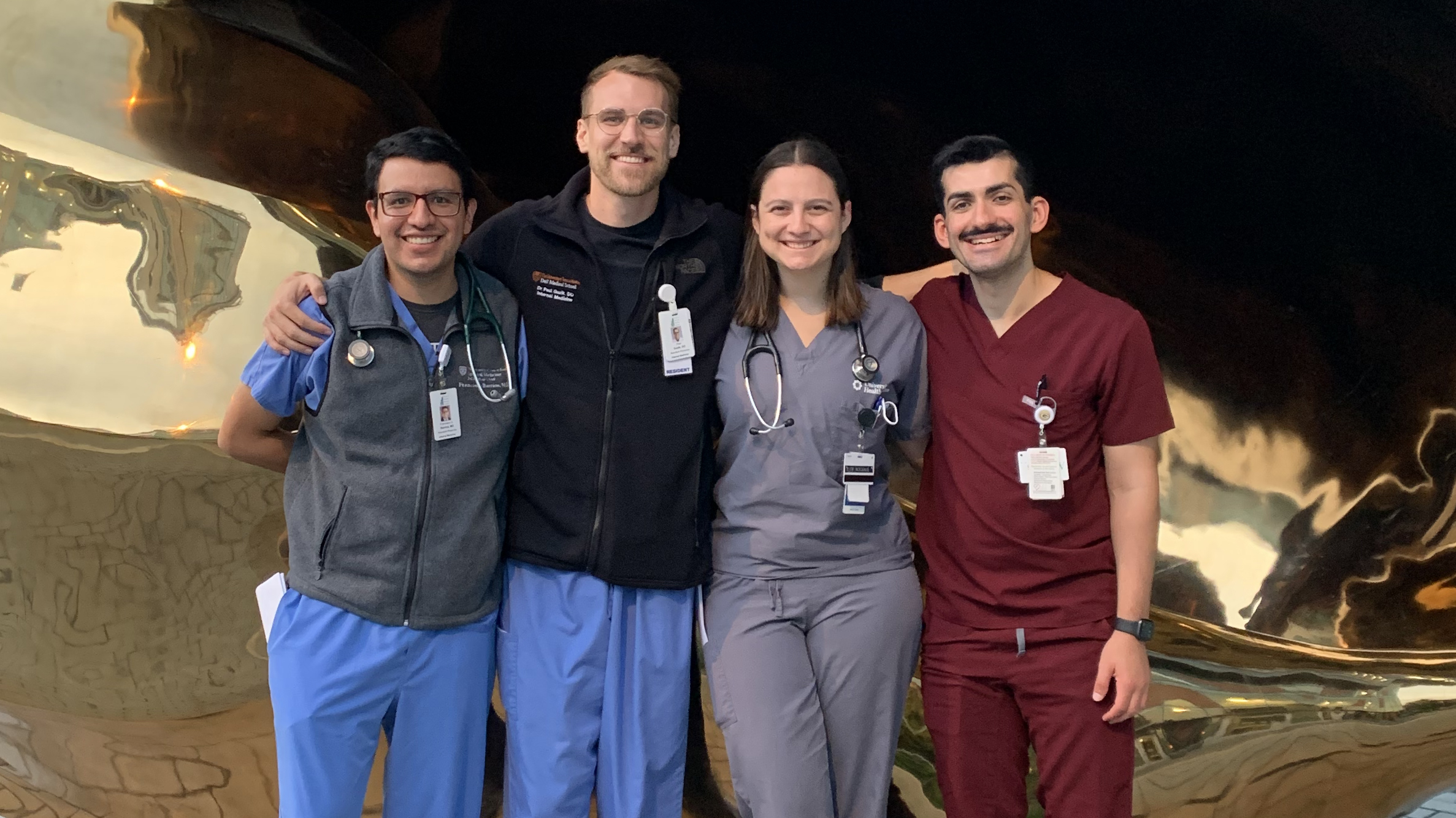
Francisco Barrios, M.D., far left, with his internal medicine co-residents.
Francisco Barrios, M.D.
Dell Med Class of 2020
Residency: Former Chief Resident, Internal Medicine, Dell Medical School
In what ways did Dell Med prepare you for residency?
I appreciated having clinical exposure early in my medical education. Hearing stories from my patients helped frame how I studied — it made me curious about what was happening and how I can help rather than focusing on a test.
I also learned about systems thinking during my time studying design thinking as it relates to health. I was always curious about the big picture, which reframed how I thought about solving problems during residency. When a mistake happened, I would focus more on any systemic issues rather than blaming specific individuals to prevent future systemic issues.
Why did you choose to stay at Dell Med to continue your training?
I liked that I knew the system already. Also, the people here are what make the program so special: I knew the patients we served were being cared for by some of the most amazing people I know. The program encouraged a growth mindset, which is difficult to accomplish because medicine is very critical of mistakes because of how high the stakes are. My program found a delicate way to balance education and service to our patients.
If you could go back and tell the premedical school version of you anything, what would it be?
Being a doctor is more than treating patients. There is so much you can help with, and finding the biggest impact in this world requires you to be more than the stereotypical doctor.
Can you share a story from your time in residency that illustrates how Dell Med prepared you for residency?
I was fortunate to participate in a project with Tessa Novick, M.D., MSW, to deliver equitable kidney care to vulnerable populations. Hispanic people are at particular risk of developing kidney disease but don’t always get the appropriate care. Our team held kidney disease screening events at the Mexican Consulate to identify Hispanic people who were at risk for kidney disease. We would then ask them if they wanted to enroll in our research and connect these individuals with a community health worker who would help them navigate the health care system to ensure that they received the care they needed. We even helped them sign up for insurance or the Medical Assistance Program if they qualified. I loved working on this project because it highlights the complexity of our current health care system and how building a community can help people get the care that they need while also thinking about other ways to demystify getting health care in America.
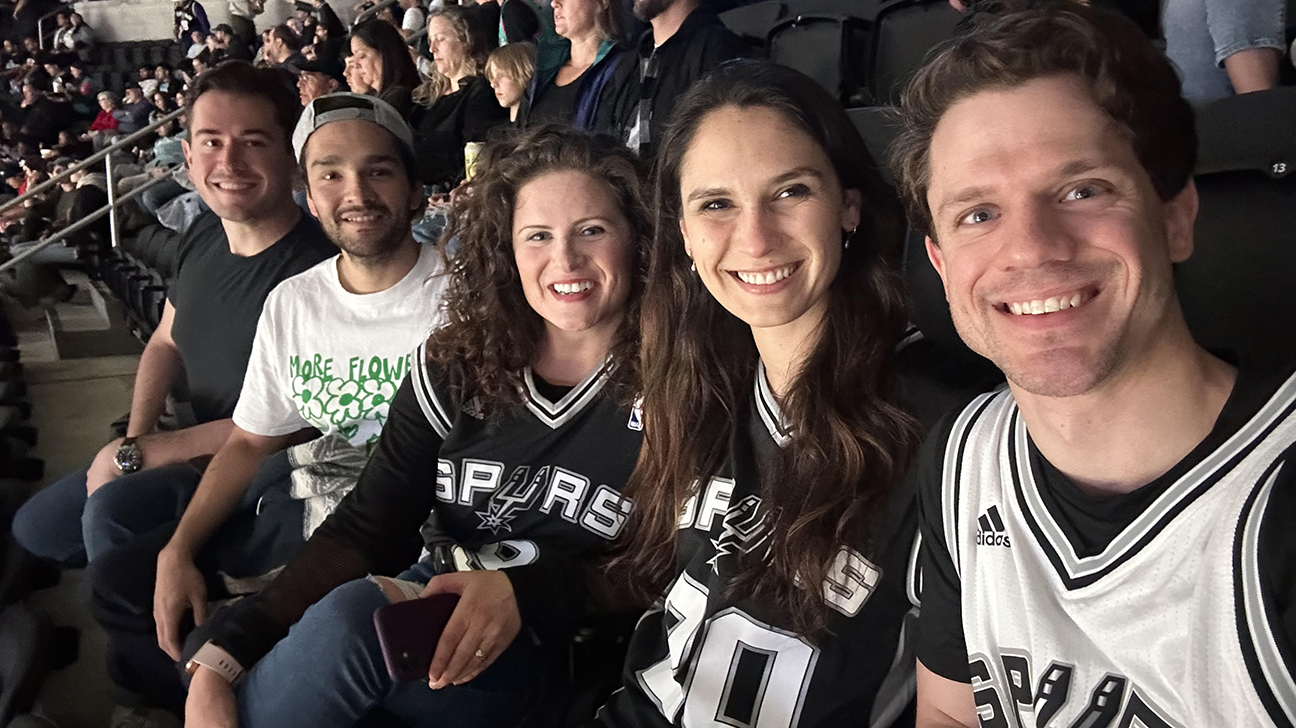
Morgan Gaither, M.D., center, with her general surgery co-residents.
In what ways did Dell Med prepare you for residency?
Dell Med prepared me for residency by setting high expectations for professionalism and quality patient care. Having a small class size and mentors and teachers who were deeply invested in growing my knowledge and encouraging my direct participation in clinical duties was especially powerful.
Why did you choose to stay at Dell Med to continue your training?
The quality of surgeons here, their deep commitment to serving this patient population, and the culture of the general surgery program cultivated by Carlos V.R. Brown, M.D., FACS, general surgery residency program director, made it an easy decision to stay. I knew I wanted to leave residency having had a lot of autonomy in my training and feeling confident in my skills. That only happens in a place like this, where the faculty is willing to invest its time to know you and guide your training on an individual level.
Desert island: You can only bring three things from your Dell Med experience with you. What would you choose?
My “study gals” group. Not only did this small group of friends keep me accountable academically, they were a source of nearly all of my favorite memories. They were my safety net when I stumbled and my cheerleaders for the wins.
My med school baby. I’d never give away any of my children, of course, but having my third baby as a first-year student was a formative experience for me in ways I probably will not ever be able to fully describe. Almost six years later, when he asks about things I’m studying for residency, I remember rocking him in the neonatal intensive care unit in his first week of life while I watched Boards and Beyond review videos for med school.
My mentor Beth Miller, M.D. If you’ve met her, you know how special she is. Sometimes it’s necessary to have someone in your corner who can be your objective sounding board and help you gain perspective.
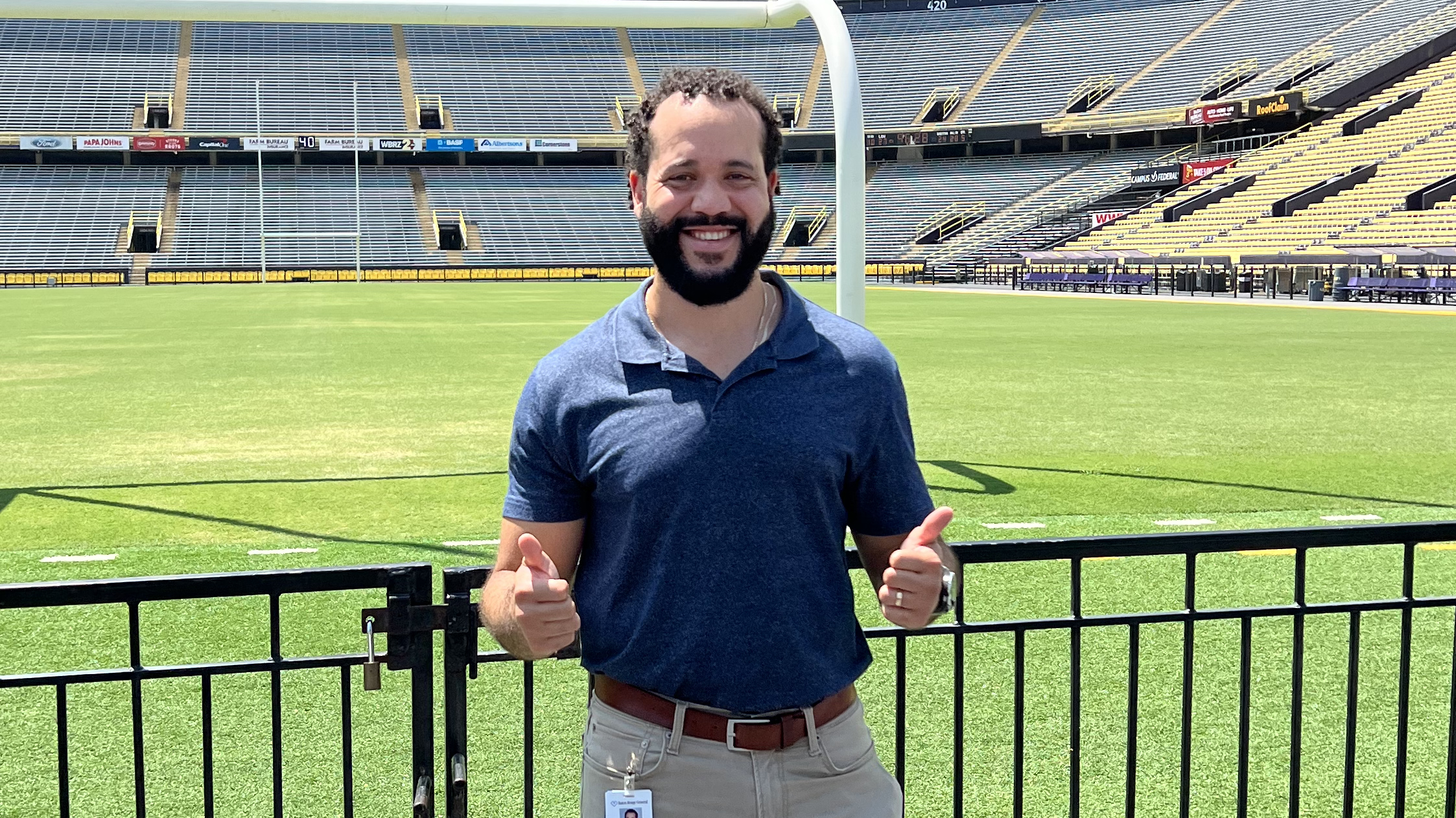
Dainon Miles, M.D.
Dainon Miles, M.D.
Dell Med Class of 2020
Residency: Emergency Medicine, University of Wisconsin
Fellowship: Sports Medicine, Louisiana State University
In what ways did Dell Med prepare you for residency?
Dell Med prepared me for residency by helping me develop and build my ability to form connections and relationships with both my patients and peer trainees. I learned the skills needed to advocate for my patients, which became extremely important as the effects of COVID-19 put significant stress on both patients and providers in the emergency department and intensive care units that I worked in as a resident. I developed trust between my patients in a time of confusion and distrust in the health care system.
Desert island: You can only bring three things from your Dell Med experience with you. What would you choose?
Frisbee Fridays. Going into medical school I would never have guessed that Ultimate Frisbee could be such a good place to develop and build relationships with my classmates, as well as air our grievances and vent about the stresses of medical school and clinical rotations. Every Friday we would gather to play at various parks around Austin. We also played in an intramural setting and went on to win multiple intramural championships, which was an awesome experience.
If I could bring my whole class with me, I would do that without question. We were a very diverse group of people coming from many different backgrounds and at different stages in our lives, but we all had a common goal driving us — to become physicians. We all possessed unique skills and did not hesitate when it came to helping each other succeed. There are not many places where you can find so many driven people willing to help each other in a competitive environment, but Dell Med provided that setting.
I would bring the resilience and adaptability that Dell Med taught me. As a part of the first class, things were sometimes difficult, and people questioned what our experience would be like. However, with the help of my classmates and faculty, we were always able to adapt and create the right environment to learn and push forward in our development as future physicians. When I read Dell Med’s mission statement and finished my interviews, I knew this was the place that would help develop me into the physician I envisioned myself being.
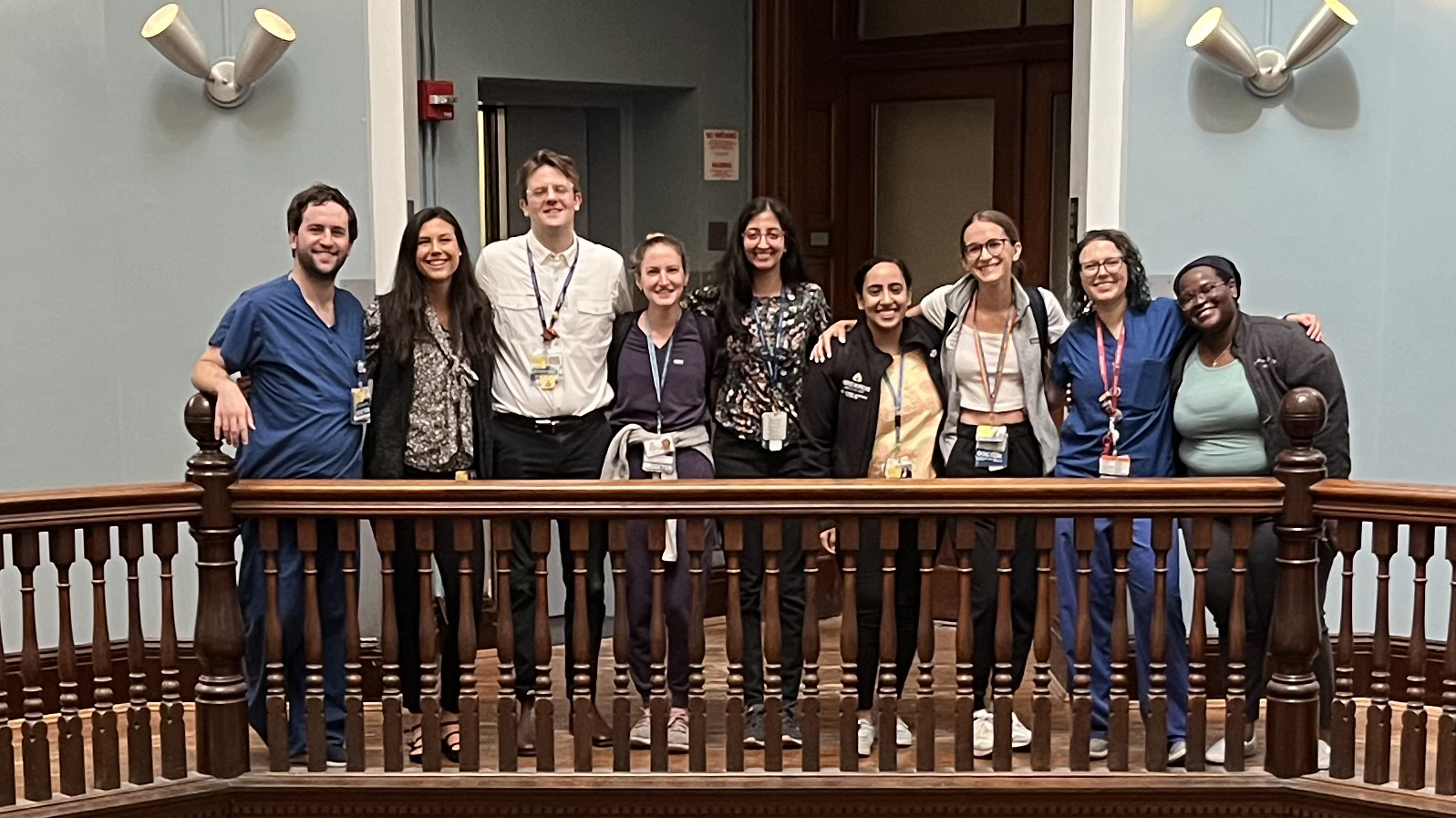
Will Squiers, M.D., far left, with his pediatric co-residents.
Will Squiers, M.D.
Dell Med Class of 2021
Residency: Year 3, Pediatrics, Johns Hopkins Children’s Center
In what ways did Dell Med prepare you for residency?
The curriculum prepared me to be a self-sufficient, independent learner, which is essential in residency and for our careers in medicine. I remember moments, particularly in the preclinical year, where I felt frustrated by the self-directed learning components of our studies. However, the real benefit was the practice of approaching any clinical question and having the confidence to find an answer you can trust, even without personal experience or expertise in that area.
As a medical trainee, the best way to learn how to take care of patients is to take care of patients, so a lot of the learning is done on the job as you have to figure things out. Obviously, you have the supervision of your senior residents and attendings — just like you have the support of your fellow group members and your faculty outside of class to ask questions — but every once in a while as a physician, your team will be tasked with taking care of a patient with a rare condition that no one has experience with, and you need to be ready to figure out how to best care for that patient as a team.
Can you share a story or specific moment from your time in residency that illustrates how Dell Med prepared you for residency?
I distinctly remember my third rotation as an intern in pediatric cardiology. I had never taken care of a patient with congenital heart disease, and all of a sudden, I was responsible for 10 patients with various forms of congenital heart defects and in various stages of their operative and cardiac care. It was overwhelming, and I certainly would not have made it through that time without the support of my colleagues on the team. However, because of my experience at Dell Med, I had the confidence that I would be able to learn what I needed to in order to keep my patients safe.
If you could go back and tell the premedical school version of you anything, what would it be?
I recently came across a quote from John Wooden that I feel encapsulates medical training quite well: “It’s what you learn after you know it all that counts.” I think this quote works in two ways.
First, no matter how much book knowledge you gain during your preclinical education, what really matters comes once you start taking care of patients. Things stick better and make so much more sense when you have patients in front of you experiencing the medical conditions and receiving the treatments you learn about in the classroom setting. And the stakes simply become much more real than words on a page or a recorded voice from a computer.
Second, in medicine, no one has or ever will know it all. Every health care provider will always have something to learn about their practice. Between advancing medical technology and therapeutics, mutations in the human genome and in existing and future pathogens, and the ever-changing landscape of health care advocacy, business and more, we have chosen careers where we can never stop learning.
We hear the phrase “lifelong learners” all the time, but for some reason, this quote really resonated with me in the past seven years of my training. It is a never-ending marathon, and every future piece of knowledge and patient encounter is what counts.